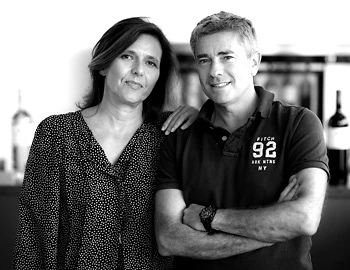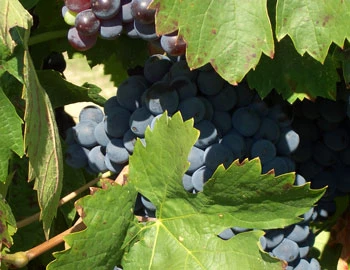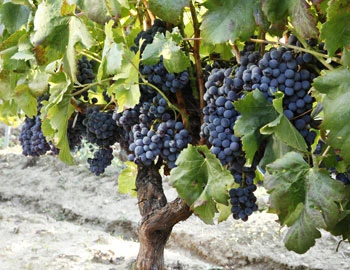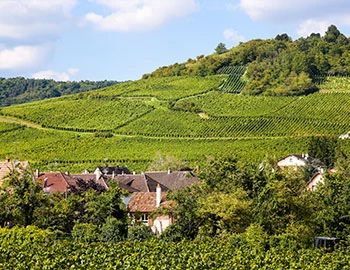
Le Caprice de Clémentine Rosé 2023
AOC Côtes de Provence, Château Les Valentines, 750 ml

| Grape variety: | Cinsault, Grenache |
| Producer: | Château Les Valentines |
| Origin: | France / Provence / Côtes de Provence |
Description
Let yourself be enchanted by the most beautiful Mediterranean way of life! An elegant rosé made from the traditional grape varieties of Provence. It has a delicate aroma of Mediterranean herbs, mandarin and red berries. On the palate, it is balanced, fresh, juicy and full of fruit. It's not hard to imagine yourself in picturesque Provence, where the Pons family took over the organic vineyard at the end of the 1990s and named it after their children Valentin and Clémentine. The daughter is therefore also the namesake of this romantic rosé, which perfectly reflects Clémentine's good humour - "caprice" in French - and sunny disposition!
Attributes
| Origin: | France / Provence / Côtes de Provence |
| Grape variety: | Cinsault, Grenache |
| Ripening potential: | 1 to 4 years |
| Drinking temperature: | 8 to 10 °C |
| Food Pairing: | Salad with vegetables, pulses, pasta, Apéro riche, Grilled fish, Mild semi-hard cheese, Vegetable cous-cous |
| Vinification: | fermentation in steel tank, pressed carefully and immediately, fermentation at low temperatures |
| Maturation: | in steel tank |
| Bottling: | filtration |
| Volume: | 13.0 % |
| Note: | Contains sulphites |
Château Les Valentines
Not far from the picturesque towns of Nice and Saint-Tropez, the owners of Château Les Valentines, Gilles and Pascale Pons, produce wines that reflect the summery lightness and intense sensuality of the beautiful Provence countryside.
Ever since the two owners turned their backs on the IT industry in Paris in 1997, they have dedicated their hearts and souls to the wines of Château Les Valentines. The estate is more than a century old and was recently extended by a modern building. The château and one of its wines are named after the two children Valentin and Clémentine. The former owners were so-called grape growers who sold their grapes to the local cooperative for further processing.

Cinsault
Sun in a glass
The southern French Cinsault, also written Cinsaut, is a curiosity among the grape varieties. It belongs to the so-called “dyer grapes”. These are red grapes in which the pigments sit not only in the skins but also in the flesh. That means, when the Cinsault is pressed, pink juice results, rather than the white you see from other grapes. Previously, the Cinsault was used to spice up lighter-coloured Burgundy. But now it has become emancipated. With a soft, fruity style, seductive raspberry and strawberry aromas and good aging potential, it mixes with the most renowned growths from the southern Rhône, around the Châteauneuf-du-Pape. Solo, it yields wonderfully aromatic rosés.

Grenache
Grenache seldom comes alone
Spaniards and Sardinians make the Grenache contentious: both claim it originated from their country. In fact, it had already appeared in both places by the 16th century. But a large number of mutations in Spain indicates that it has deeper roots on the Iberian Peninsula. The Grenache is meaty and spicy, with a wonderful, fruity sweetness and rich aromas of blackberry, cassis, plums and pepper. Under the name Garnacha, it contributes fullness to the Rioja. In Sardinia it is called Cannonau, where it yields strong, expressive wines. But its stronghold is in France. Grenache is the star in Châteauneuf-du-Pape and streams into many other assemblages from the south. Its preferred partners are Syrah and Mourvèdre. This blend is also very popular abroad. In Australia, these wines are simply called "GSM".

France
France – Philosophy in a bottle
According to French philosophy, wine should be an expression of the soil and climate. They use the word “terroir” to describe this. Terroir makes every wine different, and many especially good. French wine is regarded worldwide as an expression of cultural perfection. The French believe that humans are responsible for the quality of the berries, the vine variety for their character, and nature for the quantity. This philosophy can be expressed succinctly as: “the truth is the vineyard, not the man.”


